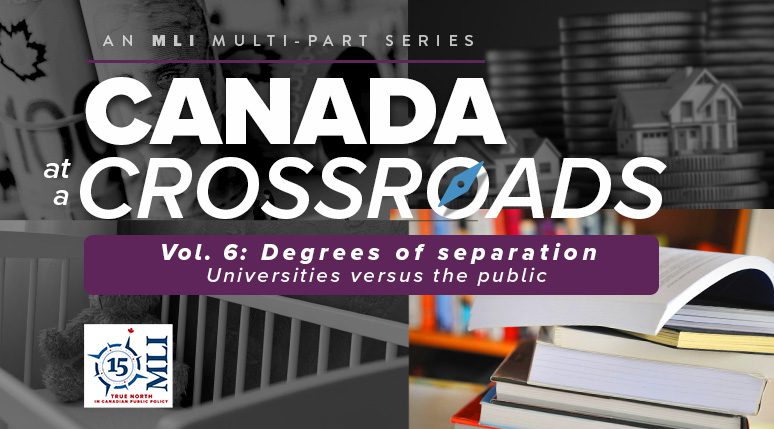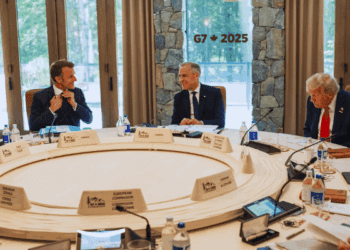THE CANADA AT A CROSSROADS SERIES
Canada is at a crossroads. The issues confronting Canada in 2025 go beyond mere setbacks and can more accurately be called crises. Unless they are resolved quickly, we face a deep and potentially permanent loss of our national standard of living and quality of life.
We hereby introduce the “Canada at the Crossroads” series of reports from the Macdonald-Laurier Institute. Each one is a relatively short essay explaining the problem at hand and outlining potential solutions. This series will not propose minor tweaks to existing strategies, nor will it look only for modest course corrections. Canada is beset by incompetent governance, runaway and rampant ideology, social malaise, and a national identity crisis.
Its future is at stake – and the time for small, hesitant steps has passed. It is in this spirit that we invite readers to join us as we confront the problems facing our country and set out serious, disruptive ideas to make 2025 the year Canada began to step back from the brink.
VOLUME 5: DEGREES OF SEPARATION: UNIVERSITIES VERSUS THE PUBLIC
By Ross McKitrick
May 21, 2025
Universities are facing a sharp decline in their public reputation.
In the US, the Trump administration is openly attacking many top universities – including taking steps to strip Harvard of its tax exempt status. The situation in Canada is less antagonistic, but there’s growing public frustration over the blatant left-wing bias and politicization of our post-secondary institutions. The public’s indifference to maintaining historical funding levels is a clear sign of this discontent.
In both the United States and Canada increasing numbers of people report limited or no confidence in universities and think they are poorly managed. While the collapse in confidence is largest among conservative voters it is nonetheless happening across the political spectrum and among both men and women.
The public is losing faith in part due to universities becoming political monocultures. Despite North Americans being nearly evenly split politically, surveys show that in both Canada and the US the left/right political split among faculty is about 90/10, with many social science and humanities disciplines polling at over 95 per cent left wing. This is very different from the situation 50 years ago, when universities’ political makeup approximately matched that of society at large.
The political tilt is, among other things, increasingly leading conservative students and scholars to self-censor. The implication is that, despite universities’ claims of prioritizing diversity, they have become entrenched in ideology and increasingly hostile to conservative viewpoints.
This bias did not happen by accident but represents the outcome of several decades of preferential treatment within the academy for proponents of liberal and left-wing perspectives, and the codification of those preferences into programs and curricula. The ongoing conflict between the US government and academia is symptom of the broader public dissatisfaction with funding universities in their current form.
Here in Canada the federal government bears some of the blame for the political drift at our universities because its major granting agencies, with a combined budget of about $5 billion, have moved away from prioritizing research excellence and now heavily promote so-called Equity, Diversity, and Inclusion (EDI) themes. In addition, there is an increasing tendency within academia to engage in hiring practices that implicitly or explicitly impose political litmus tests.
Colleges and universities still hold considerable reputational capital in society but they are spending it down and cannot expect it to last indefinitely. In order to rebuild public trust, they should commit to several changes, including:
- acknowledging the existence of a political monoculture and committing to finding a strategy to change it;
- ending political litmus tests in hiring;
- declining new faculty positions and endowed chairs that require discriminatory hiring practices;
- ending mandatory EDI courses;
- embracing institutional political neutrality;
- ending the institutional display of special cause regalia on campus; and, most importantly,
- re-establishing a culture that emphasizes the formation of students as citizens and critical thinkers, and that fosters academic freedom and rigorous inquiry.
Introduction: academia’s falling reputation
The public reputation of universities has dropped significantly over the past decade in both the United States and Canada. Figure 1 summarizes the US data reported in Blake (2023) regarding public confidence in institutions of higher education. In 2015, 57 per cent of the public reported having “a great deal” or “quite a lot” of confidence in universities, but by 2023 that had fallen to 36 per cent. In 2015, 31 per cent of the public reported having only “some” or “very little” confidence, and by 2023 that fraction had doubled to 62 per cent. Meanwhile, views appear to have firmed up, since the fraction with no opinion dropped from 12 to 2 per cent.
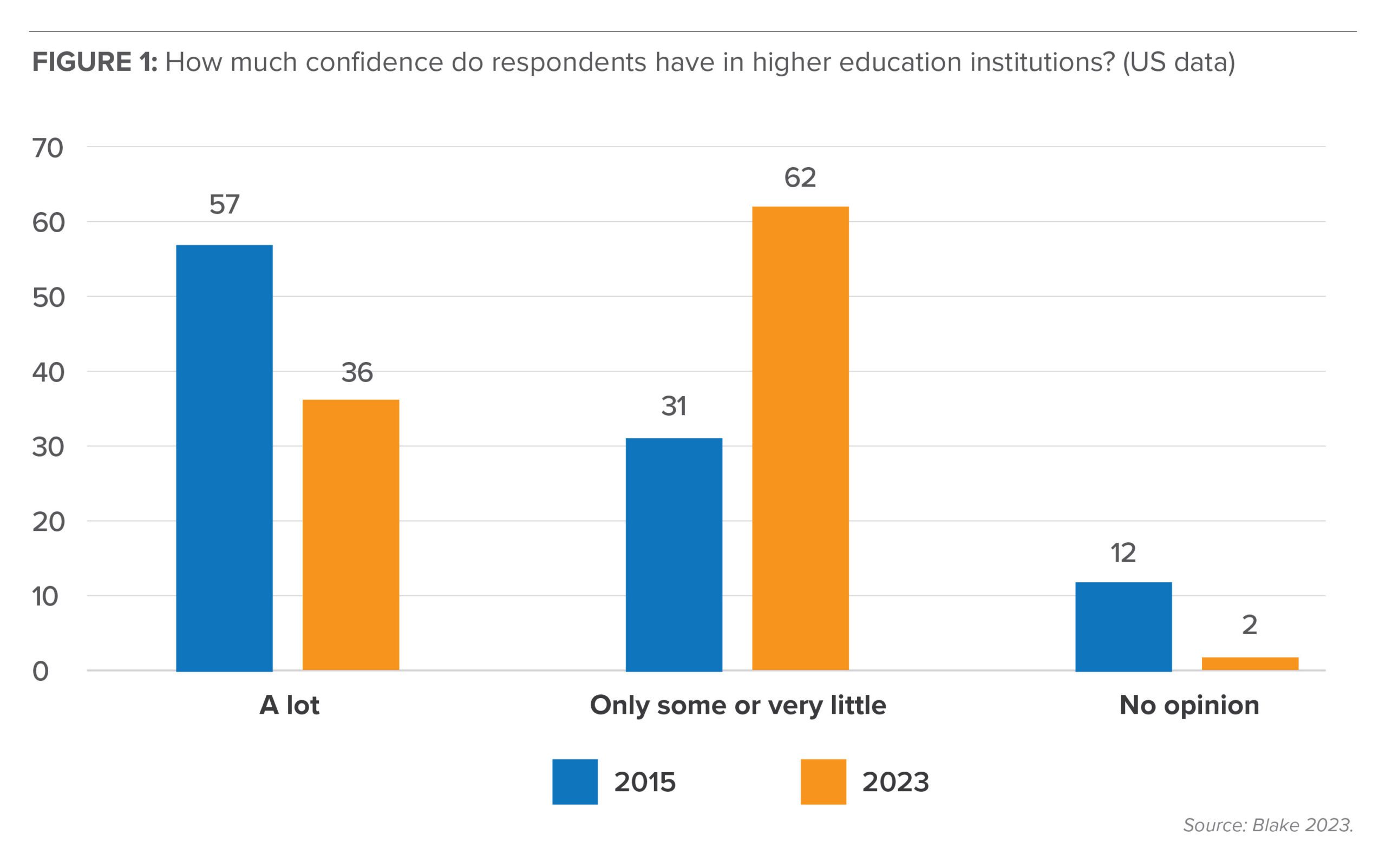
Lavigne (2024) reports that 60 per cent of Canadians believe the value of college or university education has declined over the past four years. Fifty-two per cent of Canadians still report “a fair amount” of confidence in colleges and universities while only 15 per cent say they have “a great deal” of confidence. By contrast 20 per cent say they have “not very much” confidence and 8 per cent report “no confidence at all.” More than two-thirds of the population believe conflicts about politics and social issues are becoming more severe on campus and 47 per cent think administrators are doing a bad job of dealing with protest encampments.
According to Blake (2023) the drop in US confidence has taken place among both men and women, across all age groups, and across all education levels. Indeed, among people with postgraduate degrees the fraction reporting high confidence in universities fell from 67 per cent to 50 per cent. But a wide political divide has emerged in attitudes towards universities. As shown in Figure 2, in 2015 56 per cent of Republicans reported having “a great deal” or “quite a lot” of confidence in universities but by 2023 this had plunged to 19 per cent. Independents also lost confidence: in 2015 48 per cent expressed high confidence in universities but in 2023 only 32 per cent did. Democrats displayed a more modest drop, from 68 to 59 per cent.
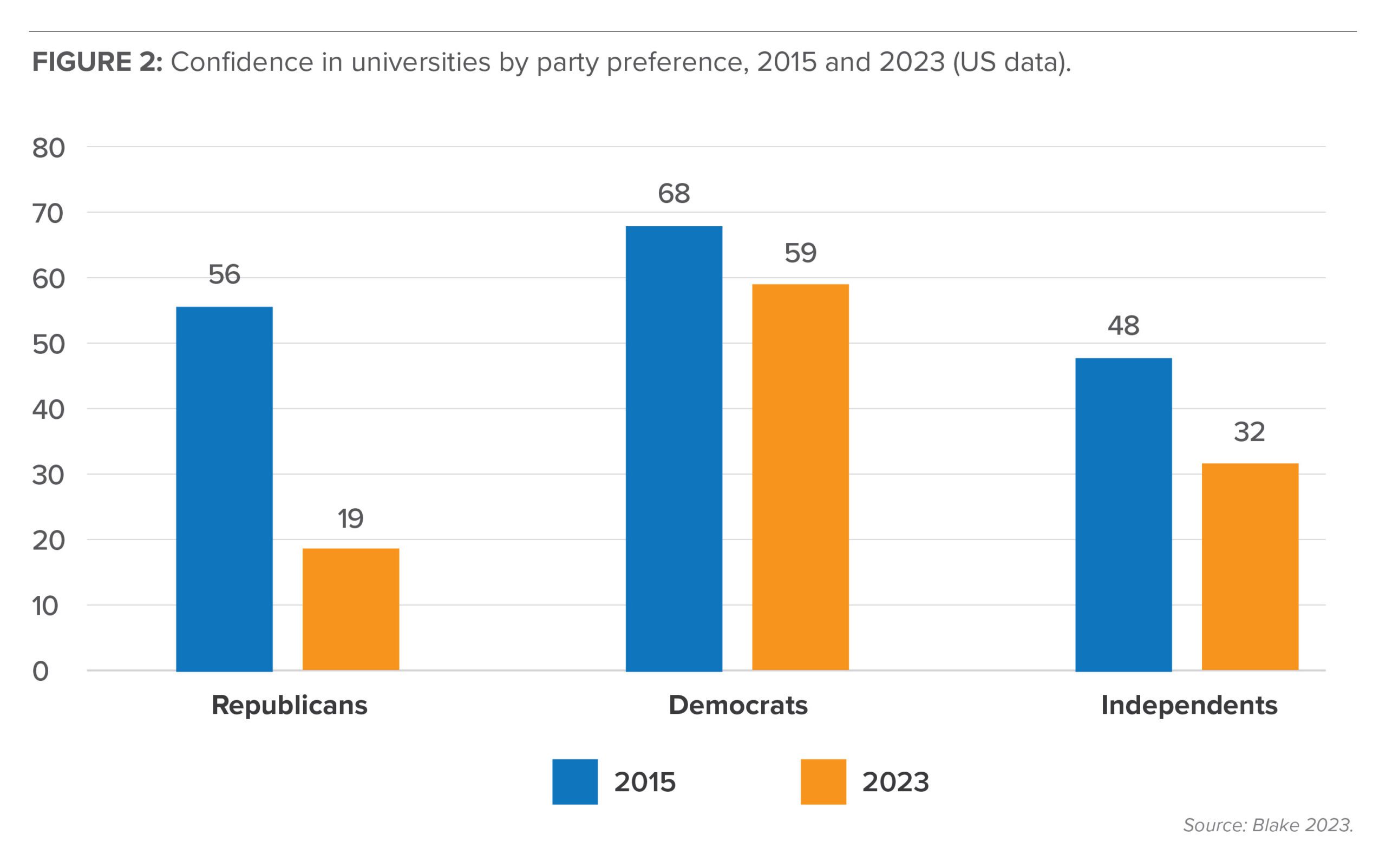
A likely reason for the plummeting confidence among US Republicans and the less dramatic drop among Democrats is the growth of a monolithic left-wing outlook among North American faculty. Figure 3 summarizes this situation for US universities. At least 80 per cent of faculty identify as Democrats regardless of discipline. Economics is the discipline with the highest proportion of Republicans, but the fraction is still only 8 per cent; it is below 4 per cent in other disciplines.
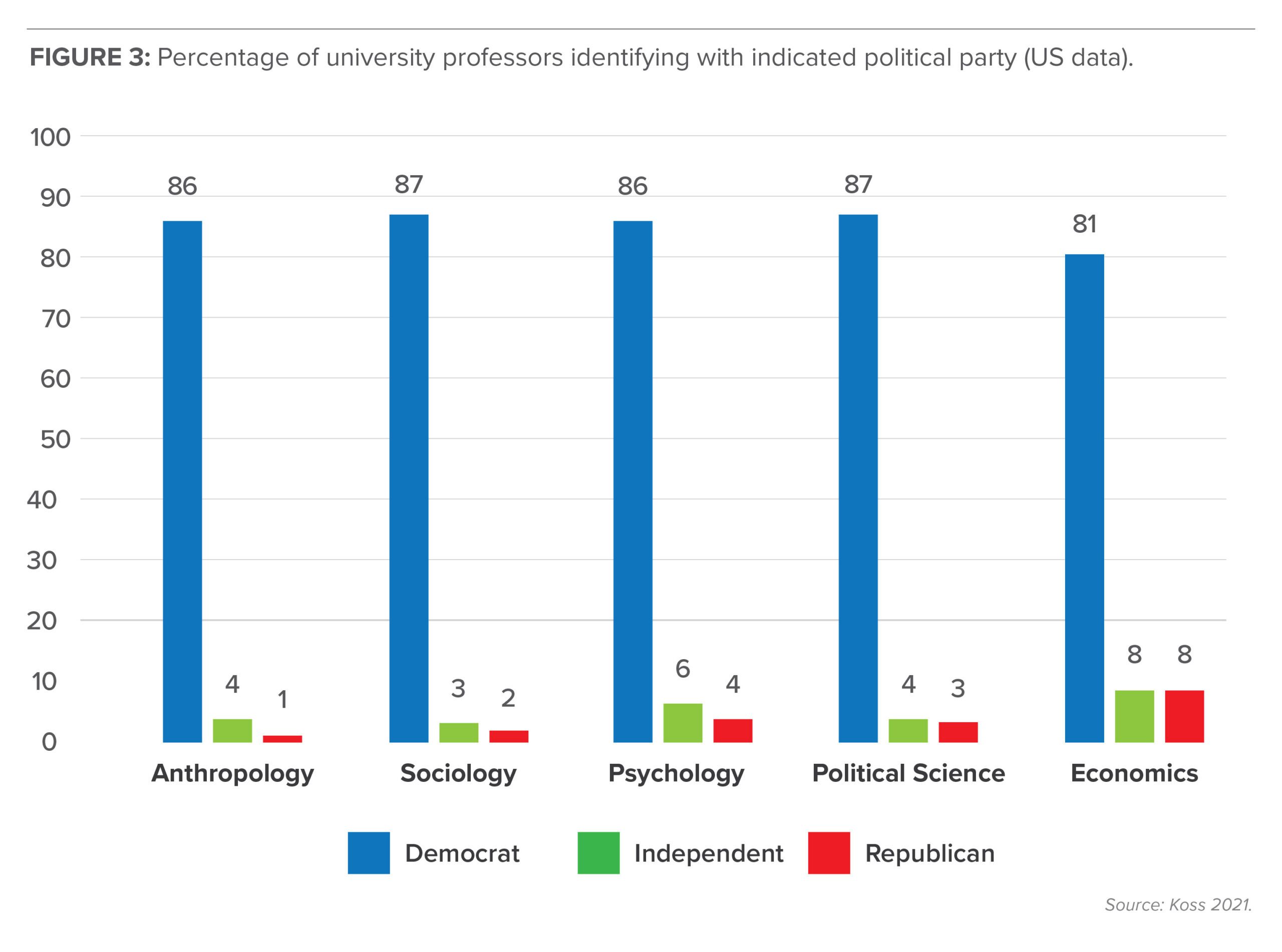
An additional feature of the data not shown in Figure 3 is that among Independents and Republicans the numbers are about evenly split among whether party affiliation is reported as “strong” versus “leans or is weak,” whereas among Democrats the party affiliation is overwhelmingly self-reported as “strong.”
A similar partisan divide is evident among Canadian faculty: 88 per cent identify as left-leaning, while only 9 per cent report voting Conservative or libertarian (Dummit and Patterson 2022).
The political monoculture translates into the overall atmosphere on campus by establishing patterns of self-censorship and silence. Among left-leaning faculty nearly 90 per cent say they do not fear making their views known at the university, whereas among right-leaning faculty 44 per cent report being somewhat or very worried that they would face negative consequences if their political outlook became known. Fifty-seven per cent of conservative faculty report engaging in self-censorship to conceal their views.
It was not always this way: in 1968, scientists evenly divided their political affiliations between conservatives and liberals, while behavioural scientists leaned left but to a smaller degree than they do today (Pielke 2024). In the early 1980s the liberal/conservative ratio among university faculty was only slightly greater than 1.0 (Abrams 2017), indicating an approximately even split of political identification, compared to a long-standing ratio of about 0.8 among the US general public (indicating a slight right-ward tilt). Since then, the liberal/conservative ratio has not changed much among US society generally, remaining just under 0.8, indicating a slight plurality continue to identify as conservative. Among first-year students the ratio rose to just over 2.0 in the early 1970s but after 1980 fell to between 1.0 and 1.5. But university faculty became the outlier in society after the mid-1980s, with the liberal/conservative ratio among them rising from about 1.2 to about 4.7 currently (Abrams 2017).
Thus, despite all their rhetoric about diversity, universities have systematically destroyed what is most central to their mission: intellectual or viewpoint diversity. They have become institutionally one-sided, highly partisan, and out of step with the public they serve. And the segment of the public on the receiving end of academia’s open disdain is now responding in kind by signalling a loss of confidence and respect for universities.
A bias this deep did not happen by accident. Rather, it reflects a long-standing, deliberate process of preferential treatment within the academy for proponents of liberal and left-wing perspectives, and the codification of those preferences into programs and curricula. Far from correcting this bias, university administrators have encouraged it and have allowed their institutions to become systemically hostile environments for students with traditional or conservative views.
As indicated by the rapidly declining public regard for universities, this ideological tilt will ultimately be self-defeating. Abrams (2017) reports evidence that the fields of study at US universities that have shown the steepest enrollment declines in recent decades are also those that exhibit the most extreme liberal bias. Another important element of the gap between public and academic perspectives on the purpose of the university emerges in the data from Dummit and Patterson (2022) regarding the practical purpose of post-secondary education. Seventy-nine per cent of the public believe that preparing students for the workforce should be either the highest or second-highest priority of universities, whereas 76 per cent of faculty ranked it the lowest or second-lowest priority. While the takeover of universities by left-wing partisans has been successful, their survival now depends on conservative taxpayers being willing to continue subsidizing institutions they no longer trust or respect. The current political upheaval in the US (Friedman 2025) suggests that this arrangement is beginning to fail.
The burden of responsibility is on academia
The federal government in Canada has contributed to the politicization of universities through its management of federal research funding (see below). But suppose a future federal government wants to remedy the situation. What should its approach to universities be? The difficulty is that if the government were, say, to order universities to hire more conservative faculty that would be seen as overt political interference and might end up being counterproductive. The most effective solutions to this problem will have to originate with universities themselves. The government should put universities on notice that they must acknowledge the problem and begin changing course. The message to Canada’s universities should be:
- Despite your commitment to “diversity,” in terms of political and intellectual diversity the data indicate that universities have become one of the most intolerant and monolithic institutions in society, enforcing a political monoculture unrepresentative of the views of the general public.
- Taxpayers are losing respect for you, and you cannot expect them to continue subsidizing your biases and prejudices.
- You need to solve this problem yourselves. We are willing to collaborate on solutions, but only after you have acknowledged that the problem exists – and have signalled your determination to fix it.
However, before the government can credibly demand universities embrace political neutrality and intellectual diversity it will have to address its own role in promoting the ideological monoculture through research funding activities. As documented in Snow (2025), Canada’s federal granting agencies are becoming increasingly oriented towards the promotion of so-called Equity, Diversity, and Inclusion ideology to the exclusion of research excellence.
Canada’s research funding agencies aren’t helping
Canada’s three main research funding programs are called tri-council (or tri-agency) and consist of the Canadian Institutes of Health Research (CIHR), the Natural Sciences and Engineering Research Council of Canada (NSERC), and the Social Sciences and Humanities Research Council of Canada (SSHRC) (Canada 2022). These agencies jointly support general and thematic research grants as well as the Canada Research Chair (CRC) program, which funds special faculty positions. The Canada Research Coordinating Committee manages the work of the agencies. (CRCC Undated).
There is a premium within universities on obtaining tri-council grants because they are competitive (making them somewhat prestigious), and success in securing a tri-council research grant triggers an applicant’s eligibility for institutional grants. Allocation in most cases is based on peer review assessment. Competition occurs within universities (because universities must select only some of the applicants to forward for federal adjudication) and among universities (where the final decisions are based on peer review assessment scores). Some granting programs such as Canada Research Chairs are triggered by a university’s past success at obtaining tri-council funding, adding to the imperative for universities to take part in the programs and submit winning applications.
The tri-council websites are:
SSHRC: https://www.sshrc-crsh.gc.ca/home-accueil-eng.aspx
NSERC: https://www.nserc-crsng.gc.ca/index_eng.asp
and CIHR: https://www.cihr-irsc.gc.ca/e/193.html
In addition to these three, the Government of Canada funds other research granting organizations such as:
- the National Research Council (NRC) of Canada: https://nrc.canada.ca/en/
- Networks of Centres of Excellence (NCE): https://www.nce-rce.gc.ca/Programs-Programmes/Index_eng.asp
- MITACS: https://www.mitacs.ca/
- plus ad hoc programs in many ministries.
In 2023, SSHRC spent 95 per cent of its $1.065 billion budget on grants and scholarships and the rest on operating expenses. The 2023 budget was 11.4 per cent higher than the previous year’s. The 2023 grant expenses rose 11.6 per cent while operating expenses rose 6.6 per cent. According to the Treasury Board Secretariat (2024) the scheduled appropriations for 2024–25 for SSHRC granting programs total $1,148,878,654, a 13.6 per cent increase over 2023.
The current budget for NSERC is $1.33 billion, 96 per cent of which goes to grants and scholarships and the rest to operating expenses. According to the Treasury Board Secretariat (2024), planned expenditures for fiscal year 2024–25 total $1,392,534,000, a 4.6 per cent increase over 2023–24.
The current budget for CIHR is $1.48 billion, 93 per cent of which goes to grants and scholarships and the rest to operating expenses. The allocation for grants and scholarships was virtually unchanged in 2023 compared to 2022 while operating expenses rose 16 per cent due to retroactive pay awards to employees resulting from collective bargaining.
The National Research Council is a legacy entity within the government that was formed in 1916 under the National Research Council Act to assist the federal government in war planning. It has grown ever since and today has a vague mandate that encompasses science research as well as industrial applications. In this sense it overlaps both NSERC (engineering research) and MITACS (industrial technology applications). The current budget allocation to cover NRC granting operations is $1.3 billion annually plus operating expenses.
The main federal research funding budget thus adds up to just over $5 billion annually and plays an influential role in steering university activity. Unfortunately, as Snow (2025) documents, EDI considerations are now so ubiquitous as to call into question whether the agencies see their primary goal as promoting research excellence or political activism. Snow distinguishes among “Mild EDI,” which primarily emphasizes fairness and inclusion in generalities but does not make specific policy requests, “Moderate EDI,” which imposes concrete requirements for preferential hiring and granting decisions for “equity targets” like women, minorities, Indigenous persons, and LGBTQ-identifying individuals, and “Activist EDI,” which advocates for sweeping institutional reforms aimed at combatting perceived oppression, in line with the goals of far left academic movements centred on critical race theory and social justice. Snow finds that every granting agency now prioritizes Mild and Moderate EDI, with Activist EDI additionally manifest at CIHR and SSHRC.
For instance, Snow reports that CIHR goes so far as to redefine “research excellence” to include explicit EDI goals. CIHR’s guidance now states: “Research is excellent when it is inclusive, equitable, diverse, anti-racist, anti-ableist, and anti-colonial in approach and impact” (quoted in Snow 2025, 26). SSHRC now asks PhD and post-doctoral applicants to “reflect on how your research design can be strengthened by considering diversity and identity factors such as, but not limited to, age, disability, education, ethnicity, gender expression and gender identity, immigrant and newcomer status, Indigenous identity, language, neurodiversity, parental status/responsibility, place of origin, race, religion, sexual orientation and socio-economic status” (quoted in Snow 2025, 27). Moderate EDI has also entered the management of the CRC program, which now imposes explicit equity and “intersectionality” targets with multiple recent examples of quota hiring in which CRC chair postings specifically exclude white male applicants (Snow 2025, 28).
Consequently, the political monoculture at universities is being reinforced by a growing political monoculture at the federal granting agencies that appears to be just as extreme. Although in the short term this synchrony of ideologies might seem convenient for universities, in the long run it is to the detriment of Canadian society as a whole because of the lack of diversity in the ideas and innovations emanating from universities and it is to the universities’ detriment because it will result in their continued distancing and alienation from mainstream society. While the university sector has inherited a great deal of reputational capital from previous generations of scholars, that capital is finite and is being spent down. A character in Hemingway’s The Sun Also Rises famously said in answer to the question of how he went bankrupt, “Two ways. Gradually and then suddenly.” Academia is, at present, in the gradual phase of going reputationally bankrupt. As it drifts further and further into fringe, leftist obsessions and ignores its own political biases, it will inevitably hit the sudden phase. One day the universities will find themselves dealing with a truly hostile government and the voting public will not come to their defence. Whether that day is in the far or near future, when it comes it will be too late for universities to begin trying to win back public respect. The work of doing so must start now.
Restoring public confidence in the university
The collapse of viewpoint diversity and the rise of a political monoculture currently afflicting universities has been a problem in the making for several decades. It will likewise take several decades to fix. The solution, as stated above, is not for the government to impose hiring quotas based on political ideology. The first step is for universities themselves to address the systemic discrimination that has caused them to become political monocultures. Doing so requires people who are comfortable with the monoculture to start considering how to dismantle it. This may be expecting a lot, but the following steps would help:
1. Universities should identify and ban political litmus tests in hiring decisions.
Universities may object that no litmus tests for hiring decisions exist, but they do; they may just not be named as such. EDI statements are the most obvious example, which is why many top US universities, including MIT, have not only stopped making them optional, but have banned their use (Sailer 2024). Meanwhile, such statements remain widespread in Canada. A recent survey by the Aristotle Foundation found that 97.5 per cent of advertisements for university jobs included some form of EDI support requirements and seven out of ten universities had one or more job postings that were restricted to applicants holding designated group identities (Hunt et al. 2025).
A related problem is rise of identity-based “studies” programs that are led by faculty committed to promoting the ideological agendas of myriad interest groups.
More generally, something accounts for the astonishing political one-sidedness in our universities and each university should try to find out why working there has become unattainable or intolerable for half the population.
2. Universities should decline endowed chairs that require discriminatory hiring.
As mentioned, most Canadian universities engage in discriminatory hiring, and even many Canada Research Chairs are now targeted to specific “equity-seeking groups” (Hunt et al. 2025) or, more accurately, specifically exclude white heterosexual males. When a faculty position is made available only to non-whites and non-males, this is not only discriminatory but is ultimately self-defeating if the purpose was to elevate the status of minority academics. As the quota practice becomes more common, people will assume that, say, every black female professor got her job because of EDI favouritism, not based on merit. No one aspires to be thought of as a diversity hire, but if the university allows quota-based hiring it eventually becomes difficult to know who among the minority faculty got their jobs on merit. If a university wants people to believe that it hired all of its faculty (and promoted them) on merit alone, that needs to be its policy.
3. Universities should stop insisting that students take mandatory courses based on EDI ideology.
At one time, many universities required all students to take a course in English writing, or a second language, or some other foundational topic. There is academic merit in such requirements. And of course, every discipline has required introductory courses students must take if they wish to advance in the field. But now it is common for universities to require that students in every program take a mandatory course rooted in “anti-racism” and EDI, which are intrinsically left-wing concepts. Although universities may have introduced these courses to foster a more tolerant and inclusive campus, they have often had the opposite effect in practise (Stevenson 2025). They amplify suspicion and resentment across social divisions and, in randomized control trials, have been found to create perceptions of bias and a desire for retribution even in control settings where no bias was present. By process of elimination, they single out white heterosexual men as the oppressors of everyone else, which cannot help but create resentment and alienation on the part of the accused.
4. Universities should get serious about institutional political neutrality.
It has become increasingly common for universities to comment publicly on news events and public controversies. As should be expected given the political leanings of the staff involved, many of the public communications from academia convey left-wing assumptions even if they don’t say anything overtly political. As an example, if after a right-wing government is elected a university announces that support and counselling are available on campus, but after a left-wing government is elected no such announcement is made, the university’s political sympathies have been declared without being explicitly stated. Universities should impose on themselves a rule of never commenting on public events, even to offer “support services,” unless those events have directly occurred on campus.
Likewise, universities decide daily which faculty research publications to feature and promote on their homepage. They should consider whether left-wing biases have influenced their decision-making, and adjust their publishing choice to ensure a balanced representation.
5. As part of the pursuit of neutrality, universities should stop flying special identity status flags and declaring special status days, weeks, or months.
Proponents of flying the Pride flag on the university flagpole during Pride month would probably, if pressed for a reason, say that it is a symbol of equality and inclusion, meant to indicate that everyone is equally welcome on campus. But in principle we already have a flag for that: it is called the Canadian flag. To the extent some groups do not believe the Canadian flag represents them the answer is not to proliferate separate identity group flags, it is to work towards ensuring Canada is genuinely inclusive. Flying, for example the Pride flag or the “Every Child Matters” aboriginal flag says, in effect, that there are certain groups we are singling out for a special welcome. Similarly, all the identity groups that get certain months and days and events and flags are singled out for special elevation and esteem. As with “anti-racism” training, the problem is that by process of elimination every group on campus is celebrated except white heterosexual men. The academic calendar becomes a year-long celebration of not being a straight white male. While this does not seem to have bothered liberals in society, it has contributed to the alienation that conservatives feel in academia.
Conclusion
Colleges and universities in Canada occupy a privileged position in society and are granted large quantities of both public funding and autonomy to pursue their goals. But politically they have become far removed from mainstream priorities and viewpoints, and their public reputation is in decline. The political orientation of Canada’s research granting agencies has tended to reinforce and amplify the problem. Universities themselves need to recognize the problem and develop strategies to rectify it.
In many respects what they need to do is return to the level of political neutrality and viewpoint balance they exhibited 50 years ago. Doing so will ultimately enhance their capacity to benefit society by creating an environment that stimulates genuinely open debate, rigorous inquiry, and social equality.
About the author
Ross McKitrick holds a PhD in economics from the University of British Columbia (1996) and is a professor of economics at the University of Guelph in Guelph, Ontario. He is the author of Economic Analysis of Environmental Policy (University of Toronto Press 2010). He has been actively studying climate change, climate policy, and environmental economics since the mid-1990s. He built and published one of the first national-scale Computable General Equilibrium models for analyzing the effect of carbon taxes on the Canadian economy in the 1990s. His academic publications have appeared in many top journals. He has also written policy analyses for the Fraser Institute (where he is a senior fellow), the CD Howe Institute, the University of Calgary School of Public Policy, and other Canadian and international think-tanks. In addition to his economics research his background in applied statistics has led him to collaborative work across a wide range of topics in the physical sciences including paleoclimate reconstruction, malaria transmission, surface temperature measurement, and climate model evaluation.
References
Abrams, Samuel. 2017. “Mind the Professors: How the Lack of Ideological Diversity on College Campuses Slows Progress and Threatens the Ideals of Liberal Education.” The American Interest, March 10, 2017. Available online at https://www.the-american-interest.com/2017/03/10/mind-the-professors/.
Blake, Jessica. 2023. “American Confidence in Higher Ed Hits Historic Low.” Inside Higher Ed, July 11, 2023. Available at https://www.insidehighered.com/news/business/financial-health/2023/07/11/american-confidence-higher-ed-hits-historic-low.
Canada Research Coordinating Committee [CRCC]. Undated. “Canada’s Research Funding Ecosystem.” Government of Canada. Available at https://www.canada.ca/en/research-coordinating-committee/corporate/canadas-research-funding-ecosystem.html.
Canada. 2022. “Research Funding and Awards.” Government of Canada. Available at https://www.canada.ca/en/services/science/researchfunding.html.
Dummit, Christopher, and Zachary Patterson. 2022. The Viewpoint Diversity Crisis at Canadian Universities. Macdonald Laurier Institute, September 15, 2022. Available at https://macdonaldlaurier.ca/the-viewpoint-diversity-crisis-at-canadian-universities/.
Friedman, Amanda. 2025. “Trump threatens to remove Harvard’s tax-exempt status.” Politico, April 15, 2025. Available at https://www.politico.com/news/2025/04/15/harvard-trump-tax-exempt-00290534.
Hunt, David, Collin May, Ven Venkatachalam, and Alex Emes. 2025. DEI and Academic Hiring in Public Universities: An Index of University Discrimination in Canada. Aristotle Foundation. Available at https://aristotlefoundation.org/study/dei-and-academic-hiring-in-public-universities-an-index-of-university-discrimination-in-canada/.
Koss, Joshua. 2021. Social Scientists’ Views on the State of Research. Discussion Paper. Institute for Public Policy and Social Research, Michigan State University. Available at https://ippsr.msu.edu/sites/default/files/socialscienceresearch.pdf.
Lavigne, Brad. 2024. “Public Opinion / New CAUT Poll: Post-Secondary Education Enjoys High Public Trust Among Canadians.” CAUT Journal, September 2024. Available at https://www.caut.ca/bulletin/2024/09/public-opinion-new-caut-poll-post-secondary-education-enjoys-high-public-trust.
Pielke, Roger, Jr. 2024. “Partisan Professors: Politicization of the American University, Part 2.” The Honest Broker Substack, December 2, 2024. Available at https://rogerpielkejr.substack.com/p/partisan-professors.
Sailer, John. 2024. “MIT Becomes First Elite University to Ban Diversity Statements.” UnHerd, May 5, 2024. Available at https://unherd.com/newsroom/mit-becomes-first-elite-university-to-ban-diversity-statements/.
Snow, Dave. 2025. Promoting Excellence… or Activism? Equity, Diversity, and Inclusion at Canada’s Federal Granting Agencies. Macdonald-Laurier Institute. Available at https://macdonaldlaurier.ca/wp-content/uploads/2025/02/20250110_-Promoting-research-excellence-or-activism-Snow_PAPER-v9-FINAL.pdf.
Stevenson, Josh. 2025. “New Study Reveals How DEI Training Increases Hostility.” Brownstone Institute, March 5, 2025. Available at https://brownstone.org/articles/new-study-reveals-how-dei-training-increases-hostility/.
Treasury Board Secretariat. 2024. 2024-25 Estimates. Government of Canada. Available at https://www.canada.ca/en/treasury-board-secretariat/services/planned-government-spending/government-expenditure-plan-main-estimates/2024-25-estimates.html.

